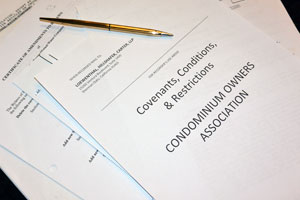LHC Newsletter, Vol 8, No. 3
“SHORT TERM RENTALS: SHOULD A HOME BE A HOTEL?”
By: David A. Loewenthal, Esq.
Robert D. Hillshafer, Esq.
As we continue through the 21st Century, commonly called the Century of Sharing, and as more and more people attempt to determine how to do more with less, car sites such as Uber and Lyft have shown that an individuals car can be used for purposes greater than simply going to and from work and taking the kids to school. Those companies have determined that individual owners can use their car for business related purposes, allowing individual car owners, within certain parameters, the ability to have their vehicle turned into not simply a personal vehicle, but also business vehicles, thus maximizing the value of that car and allowing the owner to create an income stream.
Similarly, this sharing economy is successfully creating maximum utility of real property in virtually every neighborhood in the Country. Sites such as Airbnb, HomeAway, VRBO, etc. allow owners to post their homes on various websites for rental related purposes.
The issue that has arisen regarding internet residential rentals in neighborhoods, condominium projects, etc. is a fight between owners and associations who feel that residents should be occupied by an owner or a long term tenant, thus avoiding transient occupancy, versus owners who wish to maximize the value of the property that they own by turning the property into a quasi-business like enterprise allowing the unit to be rented on a short term basis, much like a hotel. Thus, the debate is becoming whose rights should or will prevail and what, if anything, can associations do when the issue of short term rentals come up within their community.
At the outset, it is important to generally frame the issue as to why most associations are opposed to short term rentals, i.e., rentals that are typically less than six (6) months and certainly those that are thirty (30) days or less. It is generally agreed that short term rentals create additional transient activity, noise, parking issues, damage to common areas, security issues, etc. Individuals that rent on a short term basis are constantly moving in and out of units and owners within a community are treating that property much like a hotel. However, unlike a hotel where the biggest issue is leaving dirty towels on the floor, short term occupancies in an association may create tremendous disturbances as a whole and especially for those properties adjacent to the short term rental property. More succinctly, the perception is that offsite owners are less concerned about their fellow residents and more about collecting rent and that seems to be a significant problem. The shorter the rental term generally correlates into less responsible tenants.
Based upon the above, what can an Association do to stem the tide of short term rentals. At the outset, most municipalities define short term/hotel like/transient occupancy as a specific number of days. The Los Angeles City Ordinance defines it as thirty (30) days or less.
An Association’s Declaration of Covenants, Conditions and Restrictions (CC&Rs) often have provisions that either have a limited percentage of units that can be rented (i.e. a rental cap) or, in the case of short term rentals often have a minimum rental period, i.e. no rental should be for less than six (6) months or one (1) year. If the Association’s governing documents already limit or preclude short term, transient like occupancy then, that is a provision that can clearly be enforced by the Board of Directors in the event of an owner renting a unit for a few days at a time.
If such language is not already within the Association CC&Rs then, a sample CC&R provision may read as follows:
“Leasing Restrictions: An owner may rent a lot for residential purposes subject to the provisions of this article, provided: (i) that there is a written agreement. There is a written agreement between the owner and tenant, a copy of which is provided to the Association upon tenant occupancy. This document shall include the names and telephone numbers of all occupants, tenants, and their roommates. The minimum term of a lease shall be six (6) months. The lease shall be for the entire lot. Single rooms or less than the entire lot may not be leased. All tenants shall execute the lease. There should be no rentals for transient hotel purposes whatsoever or vacation rentals less than a six month term. (ii) Lease subject to governing documents. The lease shall expressly state that it is subject to all of the provisions of the governing documents, which include the Declaration, Bylaws, Articles of Incorporation and the Rules and Regulations and that in any action by the Association to compel compliance with the governing documents, the tenant can be a party thereto and subject to an injunctive remedy. The Association and each owner shall have a right of action against a tenant/occupant for any breach of any provision of the governing documents. The tenant and owner shall execute a tenant abidance agreement approved by the Board which confirms these obligations and acknowledges the tenants receipt of the Association’s governing documents.”
Assuming that the Association’s CC&Rs have a provision similar to that set forth above, most notably that short term hotel like/transient occupancy is not allowed, the Association would be entitled to enforce such a provision against an owner violating that provision through methods including a disciplinary hearing process pursuant to Civil Code section 5855; fines arising from continuing violations; a Demand for Alternative Dispute Resolution (ADR) pursuant to Civil Code sections 5925 et seq. if the action does not cease and desist; and, ultimately, a Superior Court lawsuit for breach of the CC&Rs, Injunctive Relief, etc. including seeking attorneys fees for such continuing violation.
If the Association’s documents do not contain such a provision then, the Association should strongly consider attempting to amend their CC&Rs to add such a provision as referenced above.
Unfortunately, amending CC&Rs, especially where a super majority is required, is often times difficult though, in this case, it is important in maintaining the integrity of the Association and preventing it from turning into a hotel. If the attempt to amend the CC&Rs to include short term rental restrictions fails, the Association may be able to proceed forward through a petition process with the Court pursuant to Civil Code section 4275.
Alternatively, if either the CC&R amendment process fails or, if the Board of Directors makes the decision to not go through the time, money and energy in attempting to amend the CC&Rs, then, the Board could consider adopting a Rule and Regulation expressly prohibiting short term rentals, i.e. rentals for under thirty (30) days or as otherwise defined via the applicable municipal ordinance. The basis for such a rule arises from several potential avenues including, but not limited to, the fact that such short term rentals may very well be creating a nuisance which is a provision found in virtually all CC&Rs; CC&Rs may have a preclusion for commercial business operations within the community which an owner that is renting their unit on a daily basis will qualify as. In addition, most CC&Rs allow an Association’s Board of Directors to adopt reasonable Rules and Regulations to allow for the functioning of the Association.
If an Association plans on proceeding against an owner for violation of the governing documents prohibiting short term rentals, the Association must document the information including, but not necessarily limited to, searching rental websites for postings regarding the unit and then printing off the listings so that there is “hard evidence” as to advertising and rental activity. This will provide information such as description of the property, the calendar of availability, price, contact information, amenities, etc. Sometimes the advertising descriptions sound very much like a hotel and generally describe the common area that the short term renter can use including swimming pools, tennis courts, gymnasium, etc. The Association should also document the notices provided to the owner regarding violations, hearings, etc. so they are fully prepared to proceed against the violating owner if the activity does not cease and desist.
Lastly, prior to ever engaging in litigation, it is important to understand issues that involve enforcement, including the following:
- California law prohibits “unreasonable” restraints on alienation, which means unreasonable attempts to prevent, restrict or prohibit sales or leasing of property. Consequently, when drafting CC&Rs and Rules/Regulations, the limitations and provisions have to reasonably relate to regulating legitimate interest of the Association as discussed above.
- Enforcement through injunctive relief actions to compel eviction of a tenant or prohibit future short term rentals can be an expensive process with the incurrence of attorneys fees and costs. Though a prevailing party would likely be entitled to the recovery of reasonable attorneys and costs pursuant to either the CC&Rs and/or Civil Code section 5975, the Association would still be fronting all of the fees and costs as part of the litigation.
Unfortunately, notwithstanding the difficulties of enforcement, if owners are truly violating the Association’s governing documents by renting their property on a short term transient like basis, thus turning the Association into a “hotel”, the Board of Directors may not have any choice but to proceed forward with taking all steps reasonably necessary to obtain compliance and to stop such ongoing activity.


